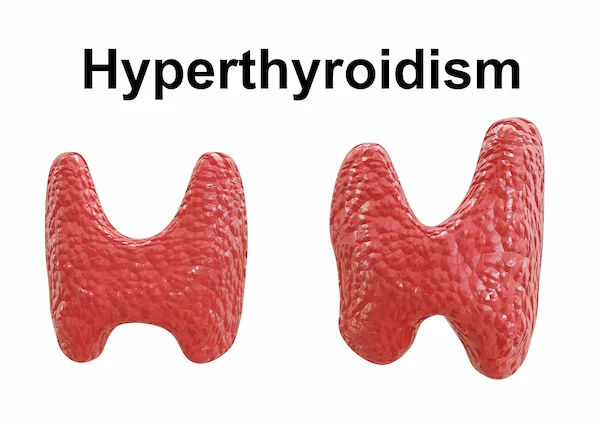Preventing Hyperthyroidism: Key Strategies
Know all about how to reduce the risk factors in hyperthyroidism. Learn tips & strategies to prevent hyperthyroidism.

Written by Dr. Dhankecha Mayank Dineshbhai
Reviewed by Dr. J T Hema Pratima MBBS
Last updated on 22nd Jul, 2025

Introduction
Hyperthyroidism is a condition where the thyroid gland becomes overactive and produces too much thyroid hormone. This can lead to various health issues, including weight loss, rapid heartbeat, anxiety, and fatigue. While some causes of hyperthyroidism (like autoimmune disorders) cannot always be prevented, there are ways to reduce your risk and maintain a healthy thyroid.
In this article, we’ll explore key strategies to help prevent hyperthyroidism and keep your thyroid functioning well.
Understanding Hyperthyroidism
Before diving into prevention, it’s important to understand what hyperthyroidism is and how it affects the body.
What Does the Thyroid Do?
The thyroid is a small, butterfly-shaped gland in your neck that produces hormones (T3 and T4) responsible for regulating metabolism, energy levels, heart rate, and body temperature. When it produces too much hormone, it leads to hyperthyroidism.
Common Symptoms of Hyperthyroidism
The common symptoms of hyperthyroidism include:
- Unexpected weight loss despite normal eating habits
- Rapid or irregular heartbeat (palpitations)
- Increased sweating and sensitivity to heat
- Nervousness, anxiety, or irritability
- Fatigue and muscle weakness
- Tremors in hands
- Difficulty sleeping
- Frequent bowel movements
If you experience these symptoms, consult a doctor for proper diagnosis and treatment.
Consult endocrinology for Personalised Advice
Key Strategies to Prevent Hyperthyroidism
Some risk factors, like genetics or autoimmune disorders, cannot be controlled, but certain lifestyle changes can help maintain thyroid health and reduce the risk of hyperthyroidism.
1. Maintain a Balanced Diet
A nutrient-rich diet supports thyroid function. Key nutrients include:
- Iodine (in moderation): Too much iodine found in iodised salt, seafood, and dairy can trigger hyperthyroidism in some people. Balance is key.
- Selenium is found in Brazil nuts, eggs, and fish. Selenium helps regulate thyroid hormones.
- Zinc supports thyroid hormone production, found in nuts, seeds, and whole grains.
- Low levels of vitamin D may increase thyroid dysfunction. Get sunlight or consume fortified foods.
Avoid excessive soy and cruciferous vegetables like cabbage and broccoli in large amounts, as they may interfere with thyroid function if eaten in excess.
2. Manage Stress Levels
Chronic stress can disrupt hormone balance, including thyroid hormones. Try:
- Meditation or deep breathing exercises
- Regular physical activity, like yoga and walking
- Adequate sleep of 7-9 hours per night
3. Avoid Smoking
- Smoking has been linked to thyroid disorders, including Graves' disease. Quitting smoking reduces this risk.
4. Limit Exposure to Environmental Toxins
Certain chemicals can disrupt thyroid function. Be mindful of:
- BPA (found in plastic containers)
Use glass or BPA-free products. - Pesticides
Wash fruits and vegetables thoroughly. - Heavy metals (like mercury)
Limit high-mercury fish (tuna, swordfish).
5. Monitor Iodine Intake
While iodine is essential for thyroid health, excessive intake (through supplements or high-iodine foods) can trigger hyperthyroidism in susceptible individuals. Stick to recommended daily amounts unless advised otherwise by a doctor.
6. Regular Health Check-ups
If you have a family history of thyroid disorders or autoimmune diseases, regular thyroid function tests (TSH, T3, T4 levels) can help detect issues early.
When to See a Doctor
If you notice symptoms like unexplained weight loss, rapid heartbeat, or extreme fatigue, consult a healthcare provider. Early diagnosis and treatment can prevent complications.
Diagnosis & Treatment Options
- Blood tests (TSH, T3, T4 levels)
- Radioactive iodine uptake test
- Thyroid ultrasound
Treatment may include:
- Antithyroid medications
- Radioactive iodine therapy
- Beta-blockers (for symptom relief)
- Surgery (in severe cases)
Final Thoughts
While not all cases of hyperthyroidism can be prevented, a healthy lifestyle, balanced diet, and stress management can significantly reduce your risk. If you suspect thyroid issues, early medical consultation is crucial for effective management.
Consult endocrinology for Personalised Advice
Consult endocrinology for Personalised Advice

Dr. Nithin Reddy Modhugu
Endocrinologist
6 Years • MBBS, MD (General Medicine), DNB (Endocrinology)
Hyderabad
Dr. Nithin's Endocrine Clinic, Hyderabad
(100+ Patients)

Dr. Gayatri S
Endocrinologist
4 Years • Suggested Qualifictaion- MBBS, MD (Internal Medicine), DM (ENDOCRINOLOGY)
Nellore
Narayana hospital, Nellore

Dr. Venkata Rakesh Chintala
Endocrinologist
8 Years • MBBS,MD( GEN MEDICINE), DM ( ENDOCRINOLOGY)
Krishna district
Sanjeevani Hospital, Krishna district

Dr. Shiva Madan
Endocrinologist
10 Years • MBBS , MD (General medicine) , DM (Endocrinology)
Bikaner
Sushma diabetes and Endocrine center, Bikaner

Dr. Arunava Ghosh
General Physician/ Internal Medicine Specialist
9 Years • MBBS,MD(GENL.MED.),DM(ENDOCRINOLOGY)
Kolkata
VDC Clinic, Kolkata
Consult endocrinology for Personalised Advice

Dr. Nithin Reddy Modhugu
Endocrinologist
6 Years • MBBS, MD (General Medicine), DNB (Endocrinology)
Hyderabad
Dr. Nithin's Endocrine Clinic, Hyderabad
(100+ Patients)

Dr. Gayatri S
Endocrinologist
4 Years • Suggested Qualifictaion- MBBS, MD (Internal Medicine), DM (ENDOCRINOLOGY)
Nellore
Narayana hospital, Nellore

Dr. Venkata Rakesh Chintala
Endocrinologist
8 Years • MBBS,MD( GEN MEDICINE), DM ( ENDOCRINOLOGY)
Krishna district
Sanjeevani Hospital, Krishna district

Dr. Shiva Madan
Endocrinologist
10 Years • MBBS , MD (General medicine) , DM (Endocrinology)
Bikaner
Sushma diabetes and Endocrine center, Bikaner

Dr. Arunava Ghosh
General Physician/ Internal Medicine Specialist
9 Years • MBBS,MD(GENL.MED.),DM(ENDOCRINOLOGY)
Kolkata
VDC Clinic, Kolkata
